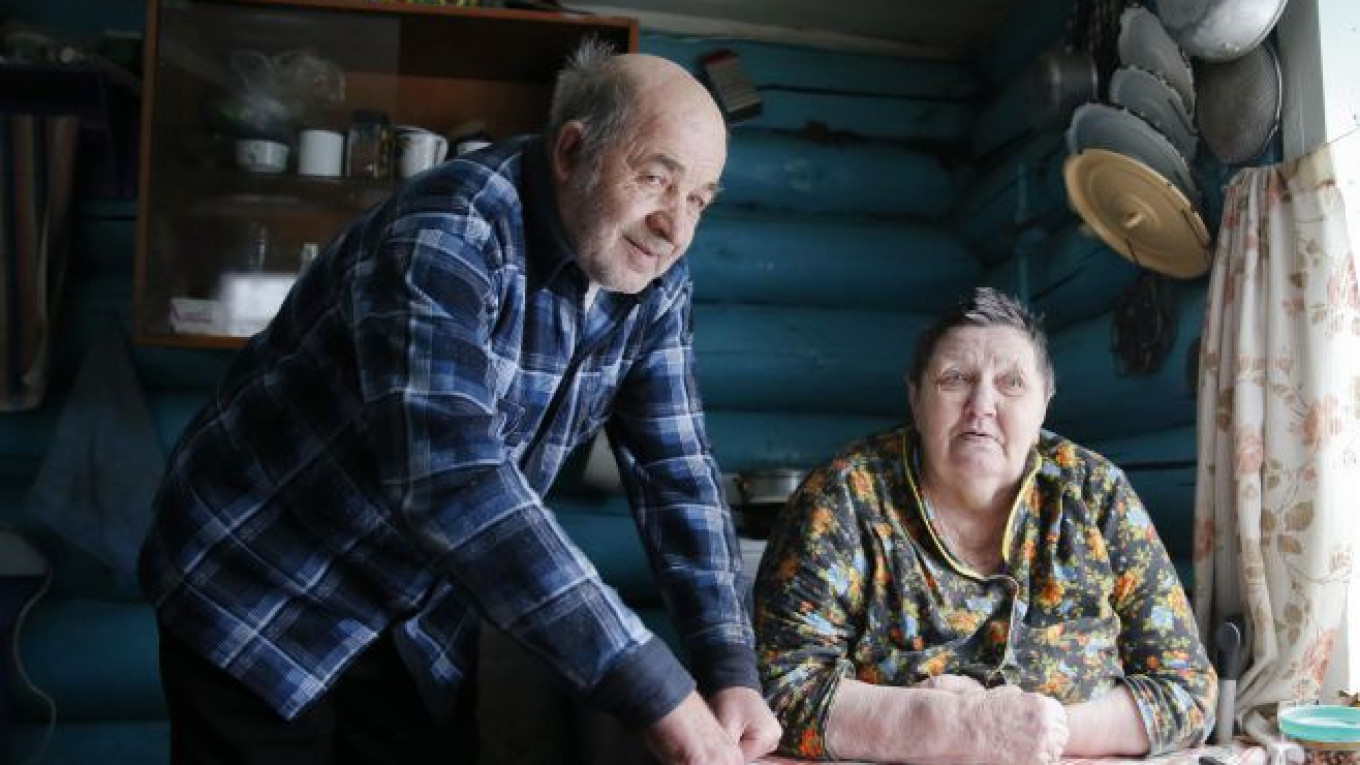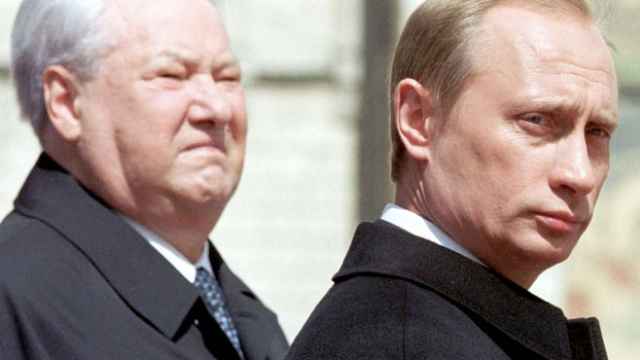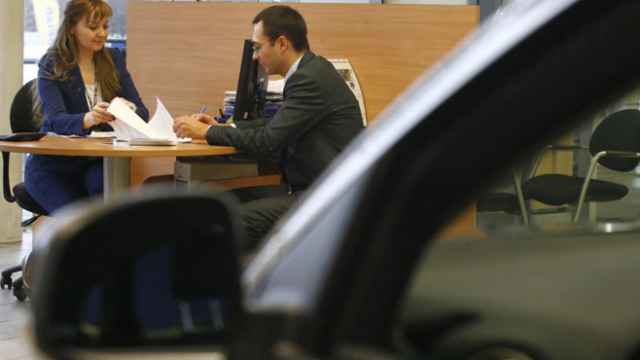BALASHIKHA/BASKAKI, Russia — On her third day in a new position at Russian Railways, Elena Kachalina heard a man die. She didn't see the train hit him as he tried to cross the tracks at Saltykovskaya, a station in the heavily populated Moscow suburb of Balashikha, but she heard the impact.
"He was young and was thrown right here, and he lay there for a very long time," she said, pointing at a path across the railway tracks.
That was seven years ago, and since then Kachalina, whose job is to supervise a crossing point at the station, says she has had to deal with people dying on the lines with tragic regularity. "Now I've got used to it," she said during a short break between the trains that thunder by her booth beside the tracks.
The railway and its death toll are emblematic of life in Russia under President Vladimir Putin. The country has prospered over the past 14 years, especially compared to the economic chaos of the 1990s. Russia boasts grand projects such as high-speed rail lines, new hospitals and the Sochi Olympics.
But behind these attention-getting projects, it has also, in some places, failed to provide basic infrastructure. At Saltykovskaya, for instance, there has been no safe way to cross the tracks, just a barrier and a red light that people routinely ignore.
Sergei Sobolyev, a Moscow journalist whose wife was killed by a train at Saltykovskaya station in early 2013, started a campaign to push state-owned Russian Railways to build a safer crossing point. He put the annual death toll at the station and its crossings at 20 to 25 people, while local media reports put it at up to 30.
Russian Railways said those numbers are too high and blamed accidents on pedestrians who violate safety rules. In early 2013, it said there had been nine accidents at the station in the previous two years but did not specify how many people died. It told Reuters in an email that it had introduced safety measures such as limiting the speed of trains from 120 to 60 km per hour. It said there were four accidents in 2013 and 2014, again without specifying how many people died. The company said a new underground crossing point will help further.
The state's ability to deliver services is likely to come under further pressure as recession looms. Many Russians complain that the country often comes up short. Basic amenities can be poorly built or nonexistent, while the standard of living for the average citizen remains far below that in the West.
Kachalina earns 30,000 rubles a month — worth about $540, down from $860 before the ruble's recent collapse. Her extended family of six lives in a nearby town in an apartment with one room and a kitchen, where her ex-husband sleeps on a sofa.
"He has no other place to live," Kachalina said, adding that she struggles to get enough sleep before work. She shares the other room with her son and daughter, her daughter's husband and her three-year-old grandson.
It's a world away from the comforts Russia's elite enjoy. Russian media, mostly controlled by the state or people supportive of the Kremlin, keep the country's vast disparities in wealth out of sight. Some aspects occasionally seep out, though. In 2013, prominent opposition leader and blogger Alexei Navalny published details of a lavish country estate owned by Vladimir Yakunin, president of Russian Railways and a longtime associate of Putin. Navalny's allegations were based on anonymously leaked pictures of the property.
"We read on the Internet what houses Yakunin has. We know that," Kachalina said. "That's disgusting, because nothing has been done for workers."
In an interview with Russian online media outlet Gazeta.ru in November, Yakunin said he had sold the property, but there was "an agreement that he may visit it if he needs to." His spokesman confirmed that information to Reuters.
Striking Oil
Putin took over as president from Boris Yeltsin, who had allowed both alcohol and oligarchs to get the better of him. Putin, a former KGB agent, brought rising living standards and order where there had been lawlessness.
The improvement wasn't just down to oil and gas, which Russia has in abundance.
When Putin arrived in the Kremlin in 2000, oil was trading at about $30 a barrel and it was still around that level in mid-2003. Yet Russia's gross domestic product rose during that time. Income per head jumped from $1,772 (in current dollars) to $2,975 in 2003, according to the World Bank.
From mid-2003, the energy market boomed. Oil hit $70 a barrel in 2006, dipped slightly, then soared to more than $100 a barrel. Money flooded into Russia's coffers. According to the World Bank, GDP per head rose to $11,700 in 2008 and $14,612 in 2013, the latest figure available.
That rapid improvement is one big reason Putin remains popular despite widespread suspicions of corruption among the elite. As Reuters has detailed this year, vast sums of state spending over the past decade have disappeared into the hands of people close to the Kremlin and hard-to-trace middlemen.
Billions of dollars in spending by state-owned Russian Railways have gone to companies that disguised their ownership and had little or no presence at their registered headquarters, Reuters found. Associates of Putin also extracted millions of dollars from a state health project and sent money to help build a lavish estate on the Black Sea, popularly known as "Putin's palace" — though Putin denies any connection to it.
Examination of other data showed that close associates of Putin helped a Ukrainian oligarch with influence in Ukrainian politics make billions of dollars from cheap Russian gas.
At the same time, ordinary Russians have not seen the full benefits of Russia's economic boom over the past 14 years. As Russia's economy shrinks because of falling oil prices and Western sanctions triggered by Moscow's role in backing the separatist movement in Ukraine, those two realities may get harder to square.
Despite such inequality, Kachalina, the railway worker, sees no sign of Putin and his style of government changing. She did not vote for him in the last election.
"I can't say anything bad about him. The only thing is, he's helping others too much but not us," she said, referring to the pro-Russian separatists in eastern Ukraine. "Why not increase wages for those who live here, the Russians, why not give them what he gives Ukraine? I'm against it," she said.
In the Forest
There are no high-speed trains where Pavel and Valentina Lunyov live. In fact, there are no trains at all. The elderly couple are from a village called Baskaki, more than 200 kilometers from Moscow. The last seven kilometers of road into the village run through pine forest and are unpaved.
This is old Russia. A lively village in Soviet times, according to Lunyov, it is now in decline. Only 15 inhabitants remain. Lunyov, 73, puts much of the blame on corruption and lack of discipline among officials.
"The village started to die about 15 years ago," he said. "Our kolkhoz [collective farm] gets money allocated from the budget to buy fuel during the sowing time, let's say two or three tons. But when the sowing time comes we get only 800 liters. And where is the rest?"
The district political chief and his deputies could not be reached for comment.
Lunyov's wife, Valentina, is 77. She suffered a stroke a few years ago that left her partly paralyzed. She can walk only a short distance and relies on her husband to care for her.
The nearest hospital is in the town of Rameshki, 16 kilometers away. In an emergency, if it is able to, the hospital sends a paramedic in an ordinary car.
When there are multiple emergencies, the ambulance service struggles to cope, said Valentina Arkadiyeva, a nurse, who usually earns about 8,000 rubles ($144) a month. "Of course, the money we receive is not enough," she said. "We are hardly surviving."
The head of the hospital was not available for comment.
Lunyov does not blame Putin personally. Instead, he blames people around the president for siphoning off money secretly. "There are too many fraudsters behind Putin's back," he said. "I think if Putin knew, he wouldn't ignore it."
Valentina agreed. "He is a good person in general," she said.
Putin has raised pensions to nine times what they were in 2001, according to the Russian state statistics agency Rosstat. Lunyov and his wife, whose combined pensions amount to 25,000 rubles ($450) a month, are grateful. "We receive enough pension," said Pavel. "We have enough for food."
Propaganda
The Kremlin's grip on the mass media means that ordinary Russians, while aware of problems at home, often have a limited grasp of how their country compares to the outside world, or its role internationally.
The West has condemned Russia for its military incursions into Ukraine this year. Lunyov believes that the main culprit behind the conflict in Ukraine was Viktor Yanukovych, the Moscow-backed former president of Ukraine, not Russia. But he showed the limitations of his knowledge when he said that he thought Yanukovych was still in Ukraine and working with the current president, Petro Poroshenko. Yanukovych fled Ukraine in February, before Russia seized Crimea, and is now living in Russia.
In Khimki, a suburb of Moscow, Yanina Pakhom has fewer illusions. Pakhom, 29, was leading a middle-class life in Donetsk in east Ukraine when pro-Russian separatists seized government offices there in the spring.
She didn't worry at first. Then, on May 26, the separatists and Ukrainian government forces clashed in a brutal battle for the city's airport, with government air power forcing the separatists back.
"We got scared after the airport," she said. "The next morning, we went to buy tickets and left in the afternoon."
Pakhom went to live with her sister in Khimki. She said she knows that starting anew will not be easy, but sees few other options.
"We decided that if we work and live here we will be more help for our relatives than living together with them in one apartment [in Donetsk]," she said. "Even if the war is over, it's not safe for my child to be there. People with guns are people with guns."
Pakhom says she believes that many Russians, especially younger ones used to the high life in Moscow, have no idea what awaits them as the country heads towards economic crisis. She has experienced downturns in Ukraine, where the economy has teetered on the edge of collapse in recent years.
"It's like Groundhog Day for us. We came [to Moscow] and we understand that it's going to happen the same here. We may be better prepared for our troubles than the Russians. It's going to be hard for fat Moscow," Pakhom said.
Oil is trading around $60, down nearly 50 percent from a year ago, and the ruble has plunged. It now takes more than 50 rubles to buy a dollar compared with 33 at the start of the year.
To protect their savings, Russians have rushed to buy dollars, euros or big ticket items such as refrigerators and cars. In one week in December, Russians spent up to three and a half times more on electronics and clothes than in the same week a year earlier, according to Russian bank VTB 24. Economic Development Minister Alexei Ulyukayev told a Russian radio station that Russians bought 30 billion U.S. dollars in cash in 2014, about a quarter of Russia's capital outflow this year.
Given the squeeze, can Putin's popularity ratings last? Surveys by Levada, a Moscow-based pollster, indicate that 85 percent of people still think he is doing a good job. In his annual address to the nation this month, Putin warned that tougher times lay ahead, but said that Russia's economy would bounce back within two years.
Living quietly in their isolated village, the Lunyovs are prepared to wait. Putin will make their lives better in the end, the couple said. "We need to wait," said Valentina. Pavel said the president should be even more forceful with his people.
"He is taking care of us," Pavel said. "But if he was as tough as Stalin, the discipline would be better."
A Message from The Moscow Times:
Dear readers,
We are facing unprecedented challenges. Russia's Prosecutor General's Office has designated The Moscow Times as an "undesirable" organization, criminalizing our work and putting our staff at risk of prosecution. This follows our earlier unjust labeling as a "foreign agent."
These actions are direct attempts to silence independent journalism in Russia. The authorities claim our work "discredits the decisions of the Russian leadership." We see things differently: we strive to provide accurate, unbiased reporting on Russia.
We, the journalists of The Moscow Times, refuse to be silenced. But to continue our work, we need your help.
Your support, no matter how small, makes a world of difference. If you can, please support us monthly starting from just $2. It's quick to set up, and every contribution makes a significant impact.
By supporting The Moscow Times, you're defending open, independent journalism in the face of repression. Thank you for standing with us.
Remind me later.






